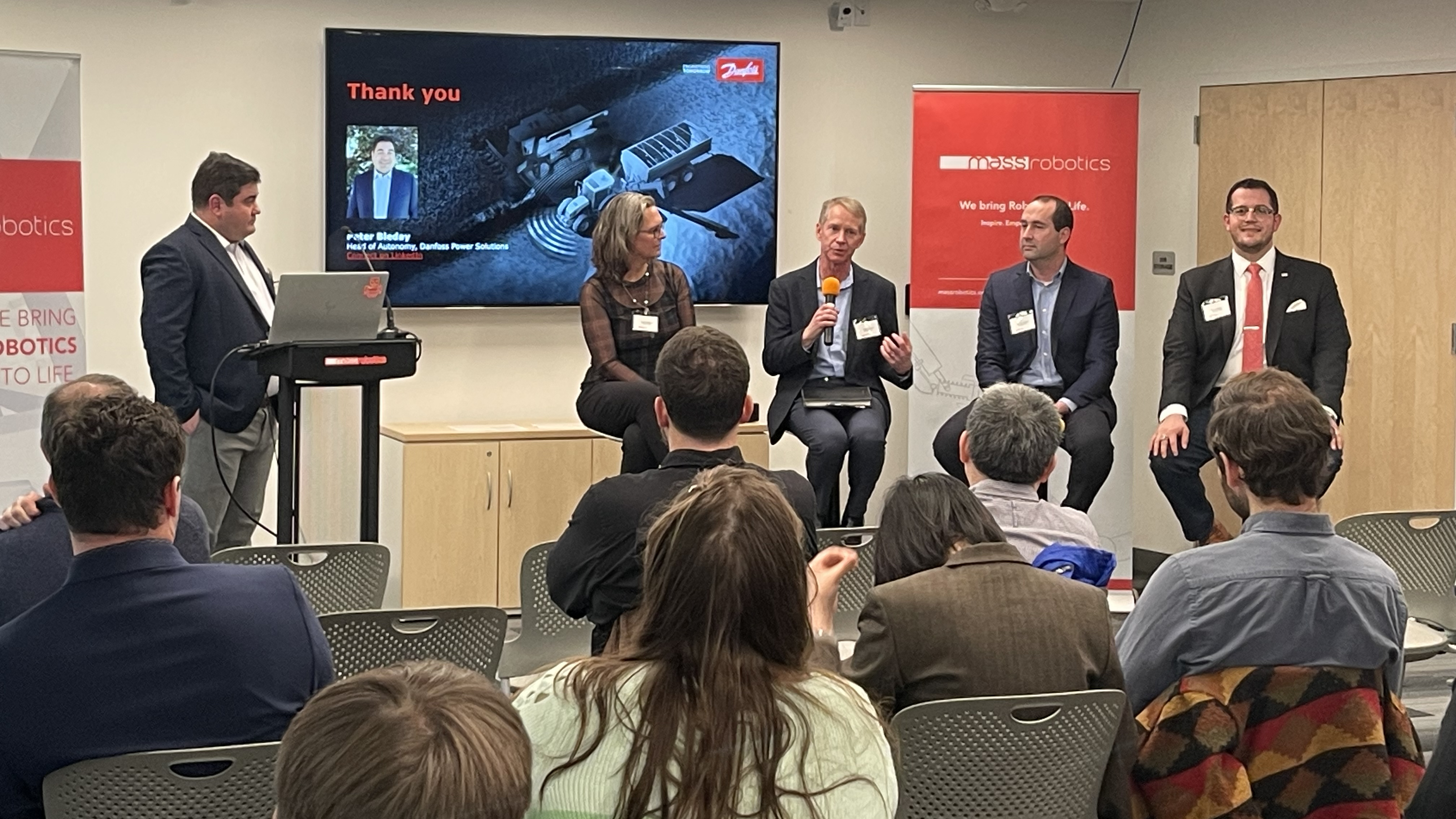
Unveiling the Future of AgTech: Highlights from the Robotics in AgTech Event at MassRobotics
MassRobotics recently hosted a Robotics in AgTech event, bringing together visionaries, innovators, and industry leaders to explore challenges and solutions in the agriculture industry. The event served as a catalyst for meaningful discussions, insightful presentations, and thought-provoking exchanges, offering a glimpse into the transformative potential of robotics in revolutionizing the agricultural landscape.
Industry Insights and Challenges:
The event kicked off with a presentation by Peter Bleday, Senior Director and Head of Autonomy Business Unit at Danfoss, who provided strategic insights into the challenges and opportunities shaping the AgTech industry. From precision agriculture to sustainable farming practices, Peter delved into the evolving landscape of agriculture and highlighted the pivotal role of technology in driving innovation and addressing pressing agricultural challenges.
Panel Discussion:
Peter Bleday led a panel discussion that brought unique perspectives and insights to the audience. Panelists included:
- Katie Stebbins, the Executive Director of the Tufts Food & Nutrition Innovation Institute
- Patrick Varley, the Product Marketing Manager (Robotics) at Mitsubishi Electric
- Otto Gryschek, the Global Director of Strategy and Operations for Chemicals and Agriculture at McKinsey & Company
- AJ Perez, the Founder and CEO of Grow Clean Group
Panelisted shared experiences from entrepreneurship to food sustainability and the role innovation plays in many of today’s agriculture challenges.
Panelists shared experiences and held discussions around issues of trust, innovation, and the evolving landscape of agricultural technology, offering insights for stakeholders across the agricultural value chain.
Building Trust in a Changing Landscape:
One of the central themes of the discussion was the importance of trust in agricultural partnerships. Panelists highlighted the challenge of gaining the trust of farmers, who are inherently risk-averse due to the unpredictable nature of their profession. Traditional channels of government outreach and recommendations were deemed insufficient, with community-driven approaches and farmer-to-farmer networks seen as more effective in building trust.
Integration of Technology and Startups:
The panelists acknowledged the critical role of technology in driving innovation within agriculture. Startups were identified as nimble and capable of developing and deploying cutting-edge solutions more rapidly than established companies. However, the panel also emphasized the need for startups to understand the unique needs and challenges of farmers, as well as the importance of case studies and testimonials in showcasing the value of their offerings.
Overcoming Barriers to Adoption:
While technological advancements hold immense promise for the agricultural sector, barriers to adoption remain. Farmers often require significant changes to their existing workflows to fully leverage new technologies. Panelists discussed the need for solutions that seamlessly integrate into farmers’ operations and highlighted the importance of large-scale test farms for validating innovations at scale.
Collaboration and Partnership:
The discussion underscored the value of collaboration between established industry players and startups. While startups bring agility and innovation to the table, established companies offer brand trust and resources to scale solutions effectively. Panelists emphasized the need for open dialogue and partnership to drive meaningful change within the agricultural ecosystem.
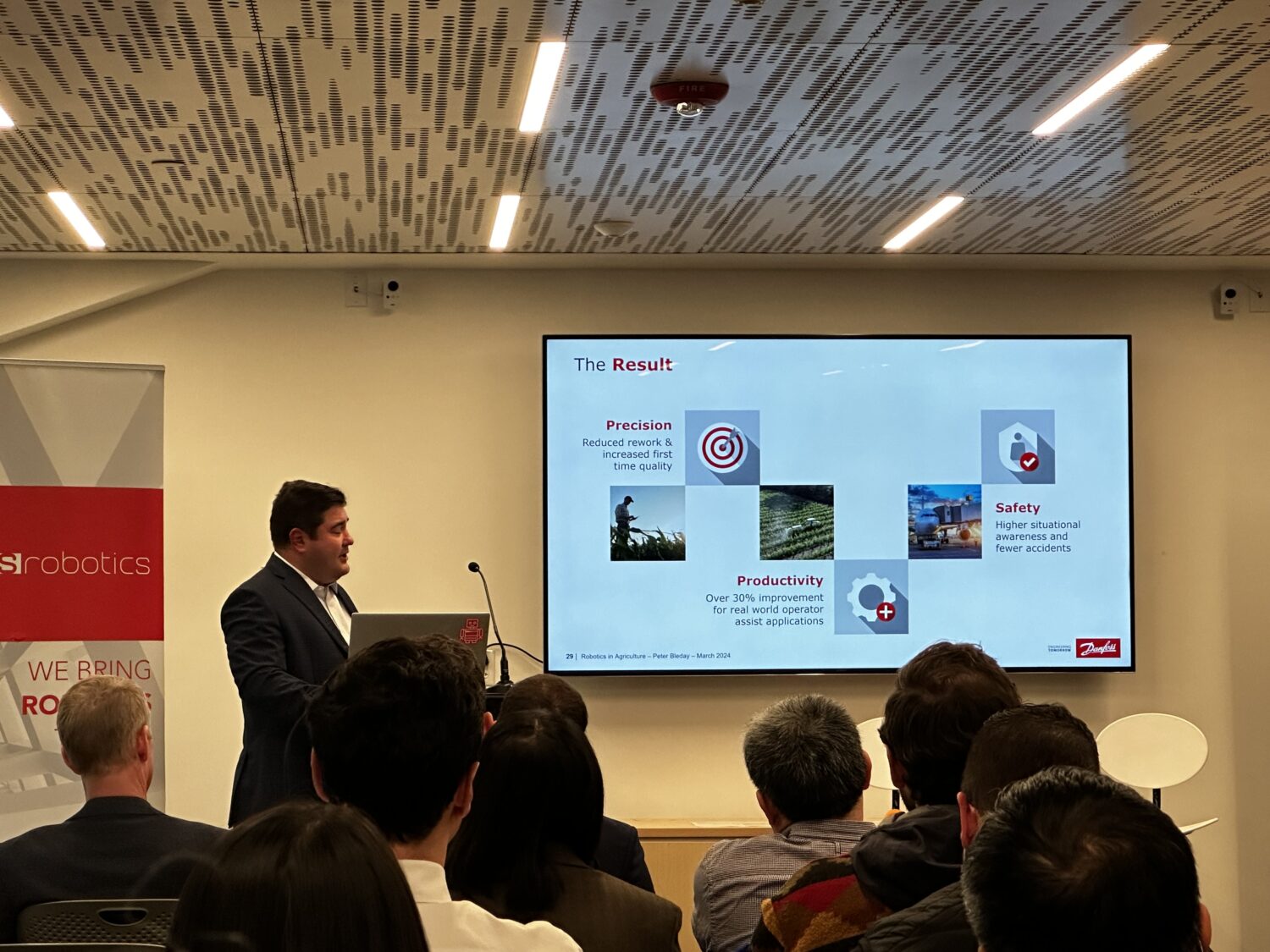
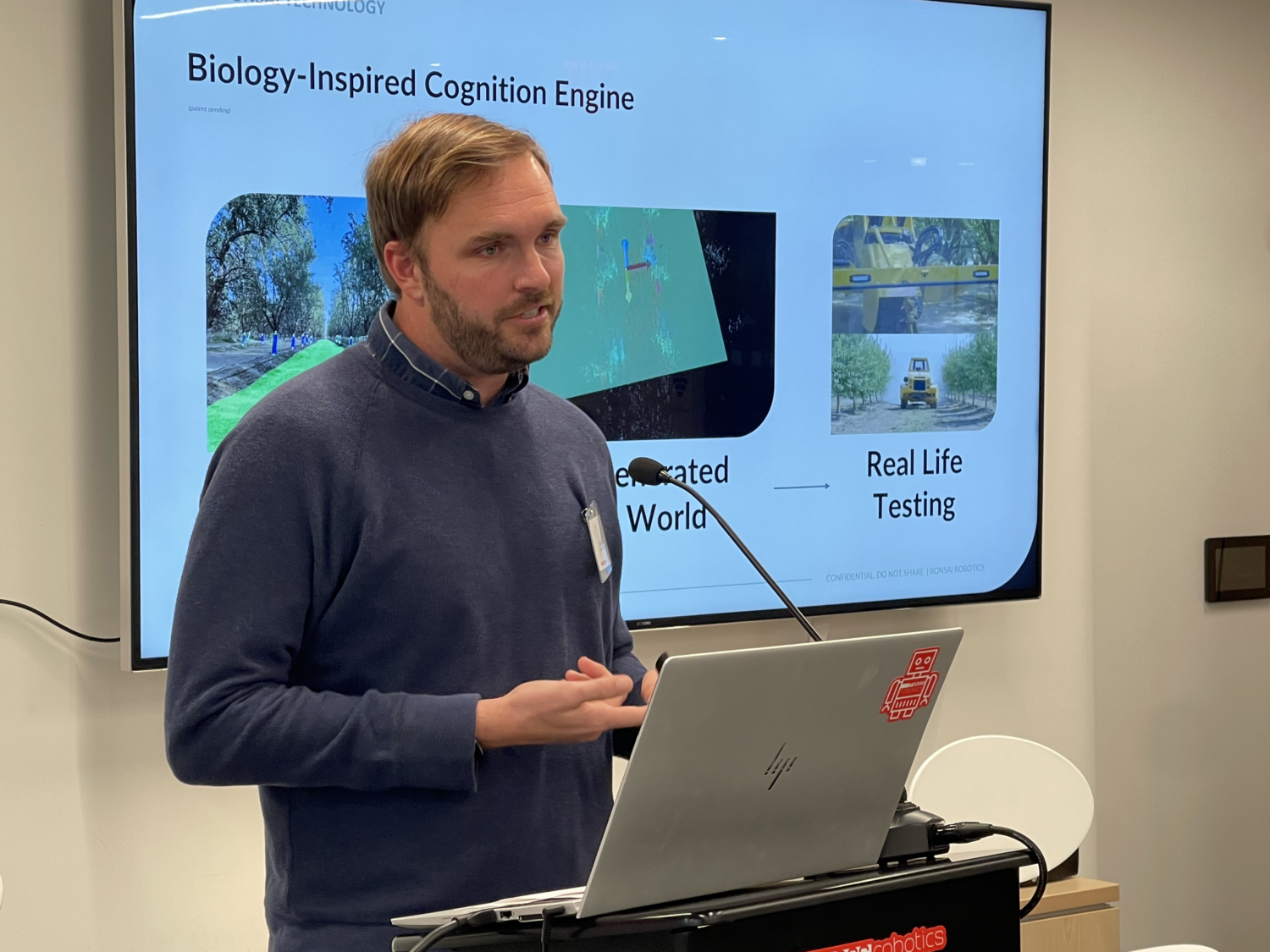
Startup Showcase: Innovative Solutions from the Ground Up
Several startups showcased their technology and robotic solutions aimed at revolutionizing agriculture.
- Tyler Niday, the CEO and co-founder of Bonsai Robotics, brought a wealth of experience in robotics and agriculture to the discussion. Having led the development of innovative vision-based and autonomous solutions at Blue River Technology and John Deere, Tyler highlighted the significance of startups in advancing precision agriculture. He discussed Bonsai Robotics’ focus on creating affordable and high-performing autonomy systems tailored for smaller and mid-sized farms. By leveraging monocular cameras and deep learning models, the company aimed to address the challenges of orchard farming and similar environments. Tyler emphasized the importance of customer feedback, strong relationships, and iterative testing in navigating the cyclical nature of agriculture and ensuring product-market fit.
- Carl Palme, Founder of Boundless Robotics, presented their mission to enable effortless home food cultivation. Leveraging AI and automation, their system addressed urban dwellers’ challenges by offering easy-to-use, sustainable solutions. Initially targeting cannabis cultivation, they aimed to provide pesticide-free, consistent strains inaccessible in urban settings. Priced at $1,500, their system promised a quick return on investment. Carl emphasized the company’s commitment to sustainability and legalization, aiming to disrupt the black market while addressing food scarcity issues.
- Matt Rosen, Founder of Haystack Ag, introduced their innovative soil carbon measurement solution tailored for growers and carbon markets. Addressing the challenge of costly and labor-intensive soil carbon verification, Haystack Ag aimed to automate the process, reducing costs and increasing throughput. By leveraging modern technology, they aimed to provide highly accurate data crucial for carbon offset markets. Their business model focused on selling carbon testing services to carbon market intermediaries, contributing to the scalability of carbon sequestration initiatives globally.
- Kent Cavender-Bares, CEO and Founder of Rowbot, presented their robotic row crop farming solution tailored for large-scale agriculture. Highlighting the challenges of inefficiency in nitrogen fertilizer usage, Rowbot aimed to address this issue by delivering nitrogen fertilizer at the right time for the crop, thus optimizing its utilization. Their patented technology allowed for precise application between rows with minimal clearance, optimizing plant treatment. With advanced prototypes tested on hundreds of real fields and a recent agreement with a major cooperative in Iowa, Rowbot was poised for commercialization, signaling significant market potential for their innovative solution.
- Onder Odemir, CEO and Founder of Ubiros Inc., introduced their soft grippers tailored for the food industry, addressing the challenge of delicate item handling without the need for human labor. With a focus on affordability and versatility, Ubiros’ soft rubber gripper offers a solution to the labor shortage in food packaging. Their grippers are electric-powered, lightweight, and capable of handling delicate items like peaches, tomatoes, and cucumbers with care, making them suitable for a range of agricultural and food industry applications. Odemir emphasized the importance of dexterity and affordability in robotic end effectors, positioning their grippers as a valuable tool for farmers and food processors seeking efficient and gentle handling solutions.
- Ahmad Zameli, CEO of Untill, introduced their indoor vertical farm, which reduces the food supply chain from 8 days to under 24 hours, extending product shelf life and cutting carbon emissions by over 30%. Their proprietary technology enables high-density planting, resulting in six times the productivity of traditional vertical farms. Untill plans to scale through partnerships and franchising, aiming to revolutionize the agricultural industry and improve access to fresh produce.
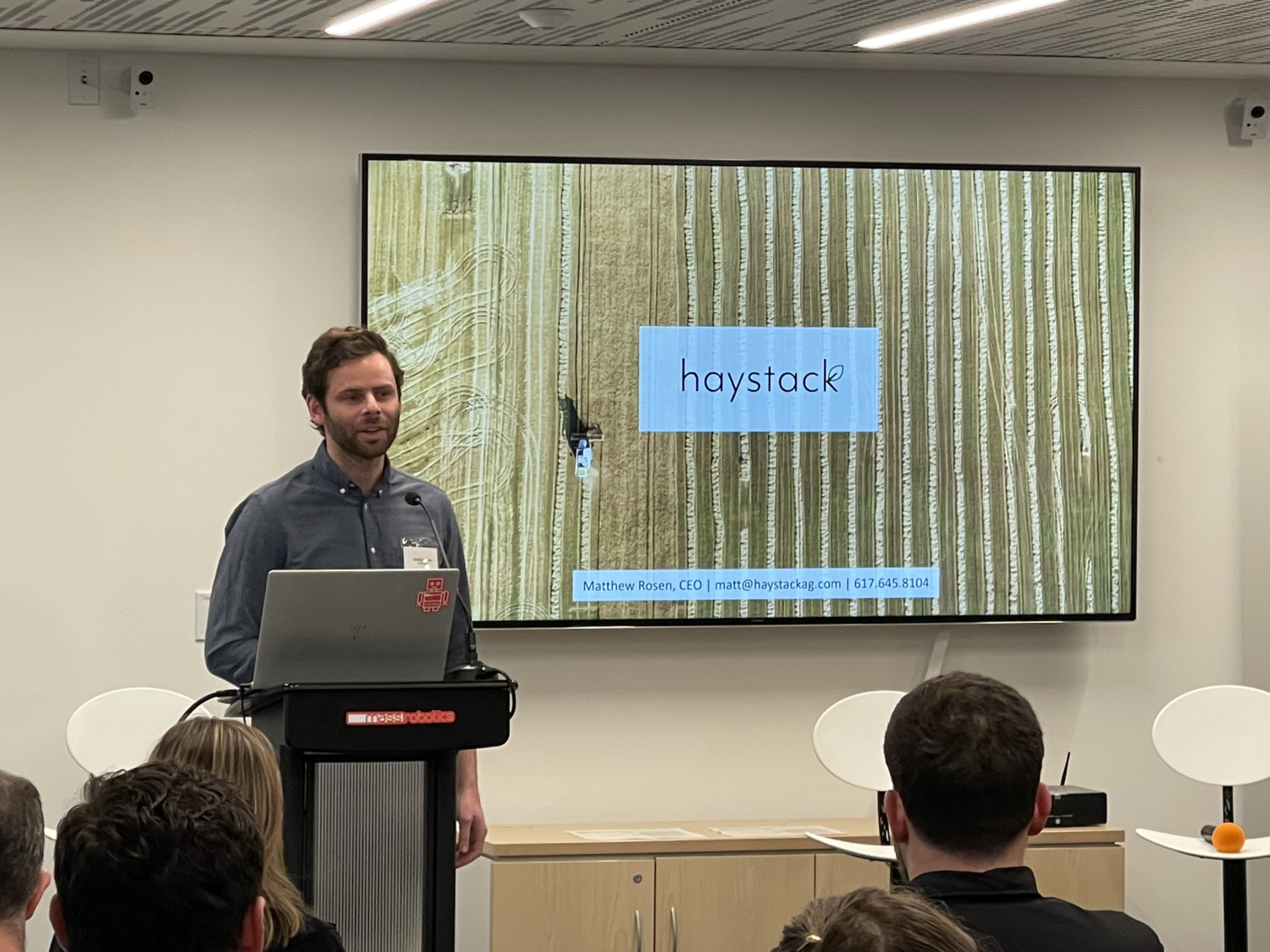
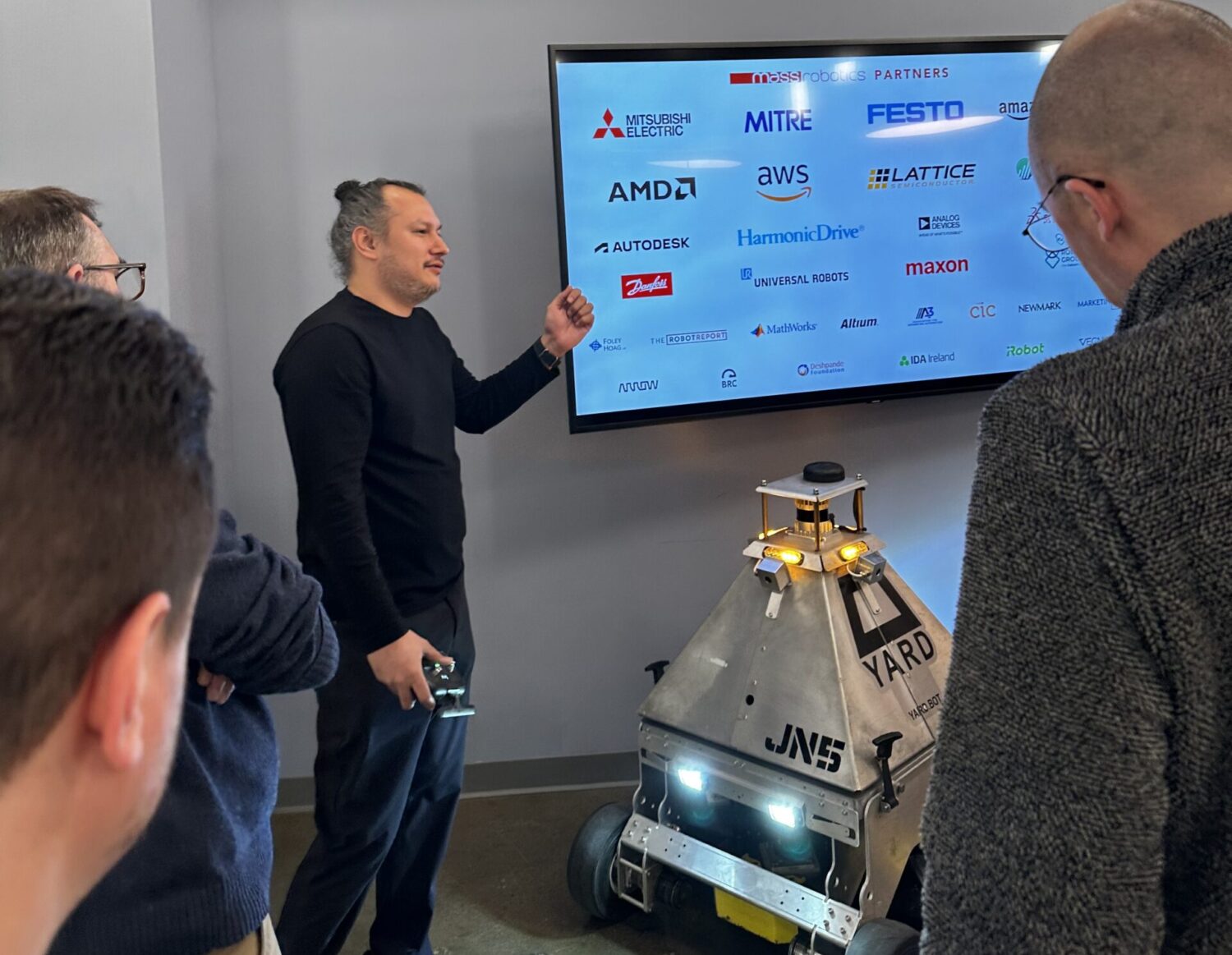
Key Takeaways:
The Robotics in AgTech event provided a platform for stakeholders to gain valuable insights into the latest advancements and emerging trends in the AgTech industry. The event fostered collaboration and networking opportunities, paving the way for future partnerships and initiatives aimed at driving innovation in agriculture. As we look to the future, MassRobotics remains committed to driving innovation in agriculture and leveraging the power of technology to create a more sustainable and resilient food system.